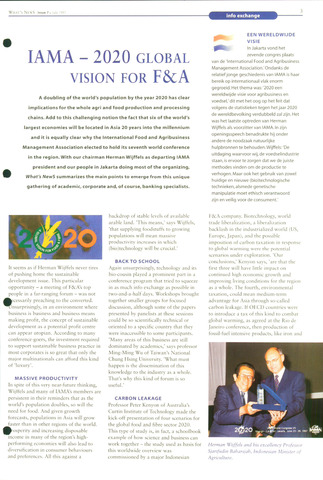IAMA - 2020 GLOBAL
VISION FOR F&A
WHAT'S NewS Issue 7 July 1997
info exchange
3
A doubling of the world's population by the year 2020 has clear
implications for the whole agri and food production and processing
chains. Add to this challenging notion the fact that six of the world's
largest economies will be located in Asia 20 years into the millennium
and it is equally clear why the International Food and Agribusiness
Management Association elected to hold its seventh world conference
in the region.With our chairman Herman Wijffels as departing IAMA
president and our people in Jakarta doing most of the organizing,
What's NewS summarizes the main points to emerge from this unique
gathering of academie, corporate and, of course, banking specialists.
EEN WERELDWIJDE
VISIE
In Jakarta vond het
zevende congres plaats
van de 'International Food and Agribusiness
Management Association.'Ondanks de
relatief jonge geschiedenis van IAMA is haar
bereik op internationaal vlak enorm
gegroeid. Het thema was: '2020 een
wereldwijde visie voor agribusiness en
voedsel,'dit met het oog op het feit dat
volgens de statistieken tegen het jaar 2020
de wereldbevolking verdubbeld zal zijn. Het
was het laatste optreden van Flerman
Wijffels als voorzitter van IAMA. In zijn
openingsspeech benadrukte hij onder
andere de noodzaak natuurlijke
hulpbronnen te behouden. Wijffels:'De
uitdaging waarvoor wij, de voedselindustrie
staan, is ervoor te zorgen dat we de juiste
methodes vinden om de productie te
verhogen. Maar ook het gebruik van zowel
huidige en nieuwe (bio)technologische
technieken, alsmede genetische
manipulatie moet ethisch verantwoord
zijn en veilig voor de consument.'
It seems as if Herman Wijffels never tires
of pushing home the sustainable
development issue. This particular
opportunity - a meeting of F&A's top
people in a far-ranging forum - was not
^fcpcessarily preaching to the converted.
^Tlnsurprisingly, in an environment where
business is business and business means
making profit, the concept of sustainable
development as a potential profit centre
can appear utopian. According to many
conference-goers, the investment required
to support sustainable business practice in
most corporates is so great that only the
major multinationals can afford this kind
of 'luxury'.
MASSIVE PRODUCTIVITY
In spite of this very near-future thinking,
Wijffels and many of IAMA's members are
persistent in their reminders that as the
world's population doublés, so will the
need for food. And given growth
forecasts, populations in Asia will grow
taster than in other regions of the world.
^fcrosperity and increasing disposable
income in many of the region's high-
performing economies will also lead to
diversification in consumer behaviours
and preferences. All this against a
backdrop of stable levels of available
arable land. 'This means,' says Wijffels,
'that supplying foodstuffs to growing
populations will mean massive
productivity increases in which
(bio)technology will be crucial.'
BACK TO SCHOOL
Again unsurprisingly, technology and its
bio-cousin played a prominent part in a
conference program that tried to squeeze
in as much info exchange as possible in
two-and-a-half days. Workshops brought
together smaller groups for focused
discussion, although some of the papers
presented by panelists at these sessions
could be so scientifically technical or
oriented to a specific country that they
were inaccessible to some participants.
'Many areas of this business are still
dominated by academies,' says professor
Ming-Ming Wu of Taiwan's National
Chung Hsing University. 'What must
happen is the dissemination of this
knowledge to the industry as a whole.
That's why this kind of forum is so
useful.'
CARBON LEAKAGE
Professor Peter Kenyon of Australia's
Curtin Institute of Technology made the
kick-off presentation of four scenarios for
the global food and fibre sector 2020.
This type of study is, in fact, a schoolbook
example of how science and business can
work together - the study used as basis for
this worldwide overview was
commissioned by a major Indonesian
F&A company. Biotechnology, world
trade liberalization, a liberalization
backlash in the industrialized world (US,
Europe, Japan), and the possible
imposition of carbon taxation in response
to global warming were the potential
scenarios under exploration. 'Our
conclusions,' Kenyon says, 'are that the
first three will have little impact on
continued high economie growth and
improving living conditions for the region
as a whole. The fourth, environmental
taxation, could mean medium-term
advantage for Asia through so-called
carbon leakage. If OECD countries were
to introducé a tax of this kind to combat
global warming, as agreed at the Rio de
Janeiro conference, then production of
fossil-fuel intensive products, like iron and
Herman Wijffels and his excellency Professor
Sjarifudin Baharsjah, Indonesian Minister of
Agriculture.

